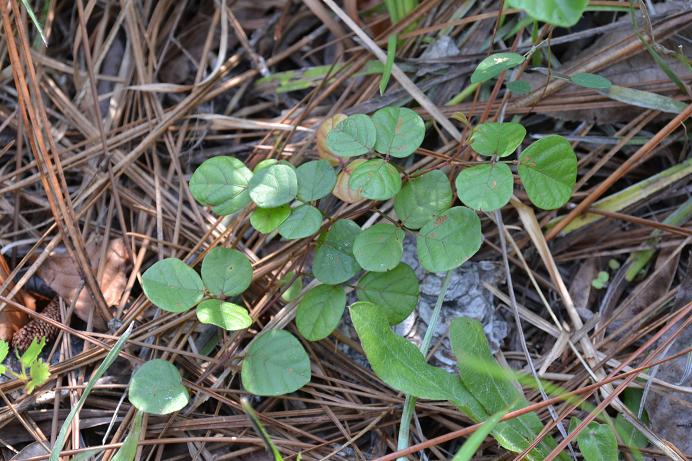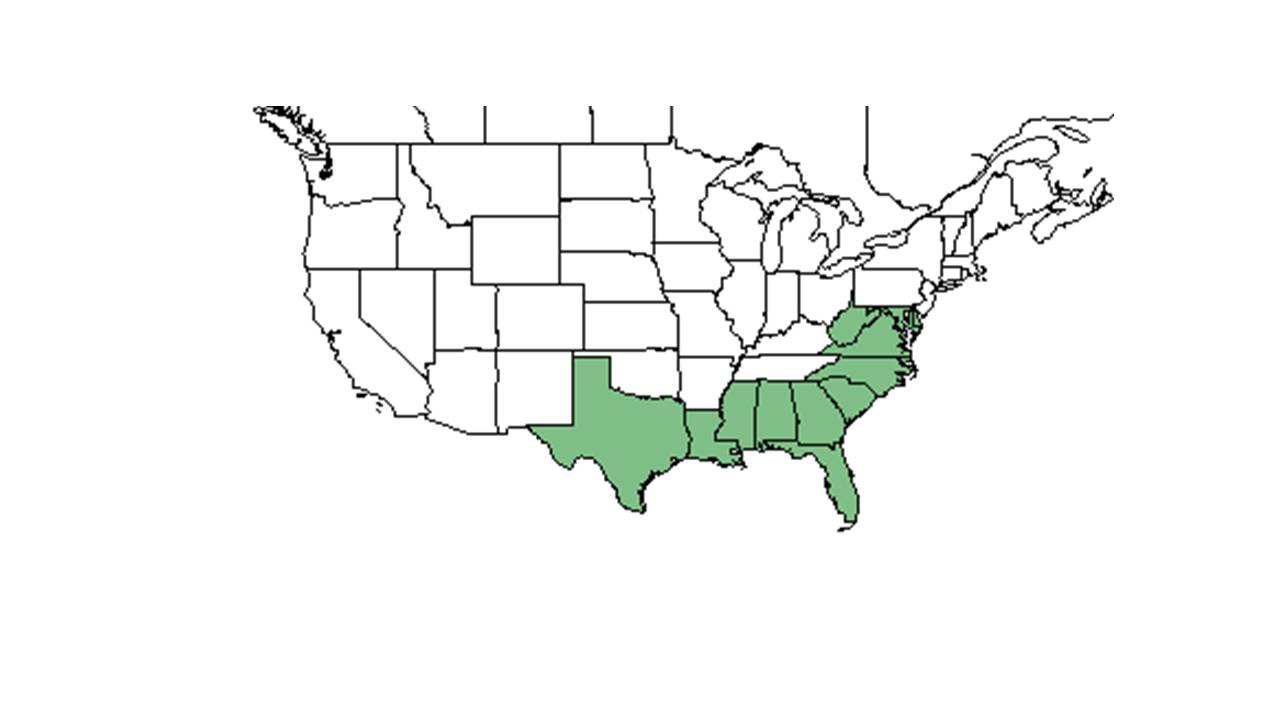Difference between revisions of "Desmodium lineatum"
KatieMccoy (talk | contribs) |
|||
| Line 29: | Line 29: | ||
===Habitat=== <!--Natural communities, human disturbed habitats, topography, hydrology, soils, light, fire regime requirements for removal of competition, etc.--> | ===Habitat=== <!--Natural communities, human disturbed habitats, topography, hydrology, soils, light, fire regime requirements for removal of competition, etc.--> | ||
It is found in frequently burned upland longleaf and shortleaf pine native and old-field communities (Ultisols) (Brewer and Cralle 2003, FSU Herarium), pine-oak sandhills (Entisols), pine flatwoods (Spodosols), and open areas within upland hardwood forests. Thrives in frequently burned (1-2 year fire interval) areas (Gilliam et al 2009, FSU Herbarium). Occurs primarily on sandy soils but can occur on a wide range of soils including sandy loam and sandy clay (FSU Herbarium). It occurs in both full sun and partially shade (FSU Herbarium), but having a prostrate habit it is not tolerant of very dense groundcover vegetation (Robertson observation). It is occurs in both native communities and in areas with a hsitory of soil disturbance (FSU Herbarium, Robertson observation). | It is found in frequently burned upland longleaf and shortleaf pine native and old-field communities (Ultisols) (Brewer and Cralle 2003, FSU Herarium), pine-oak sandhills (Entisols), pine flatwoods (Spodosols), and open areas within upland hardwood forests. Thrives in frequently burned (1-2 year fire interval) areas (Gilliam et al 2009, FSU Herbarium). Occurs primarily on sandy soils but can occur on a wide range of soils including sandy loam and sandy clay (FSU Herbarium). It occurs in both full sun and partially shade (FSU Herbarium), but having a prostrate habit it is not tolerant of very dense groundcover vegetation (Robertson observation). It is occurs in both native communities and in areas with a hsitory of soil disturbance (FSU Herbarium, Robertson observation). | ||
| + | |||
| + | Associated species include ''Desmodium ciliare, D. floridanum, D. ochroleucum, D. rotundifolium, D. laevigatum, Quercus laevis, Pinus elliotti'' (FSU Herbarium). | ||
===Phenology=== <!--Timing off flowering, fruiting, seed dispersal, and environmental triggers. Cite PanFlora website if appropriate: http://www.gilnelson.com/PanFlora/ --> | ===Phenology=== <!--Timing off flowering, fruiting, seed dispersal, and environmental triggers. Cite PanFlora website if appropriate: http://www.gilnelson.com/PanFlora/ --> | ||
Revision as of 12:32, 22 October 2015
| Desmodium lineatum | |
|---|---|

| |
| Photo taken by Kevin Robertson | |
| Scientific classification | |
| Kingdom: | Plantae |
| Division: | Magnoliophyta - Flowering plants |
| Class: | Magnoliopsida – Dicotyledons |
| Order: | Fabales |
| Family: | Fabaceae ⁄ Leguminosae |
| Genus: | Desmodium |
| Species: | D. lineatum |
| Binomial name | |
| Desmodium lineatum DC. | |

| |
| Natural range of Desmodium lineatum from USDA NRCS Plants Database. | |
Common name: Sand ticktrefoil
Contents
Taxonomic notes
Description
Distribution
Found in Alabama, Georgia, Florida, and South Carolina (NRCS Plants Database). It is primarily found in the panhandle and upper peninsular of Florida (ISB Plants Database).
Ecology
Habitat
It is found in frequently burned upland longleaf and shortleaf pine native and old-field communities (Ultisols) (Brewer and Cralle 2003, FSU Herarium), pine-oak sandhills (Entisols), pine flatwoods (Spodosols), and open areas within upland hardwood forests. Thrives in frequently burned (1-2 year fire interval) areas (Gilliam et al 2009, FSU Herbarium). Occurs primarily on sandy soils but can occur on a wide range of soils including sandy loam and sandy clay (FSU Herbarium). It occurs in both full sun and partially shade (FSU Herbarium), but having a prostrate habit it is not tolerant of very dense groundcover vegetation (Robertson observation). It is occurs in both native communities and in areas with a hsitory of soil disturbance (FSU Herbarium, Robertson observation).
Associated species include Desmodium ciliare, D. floridanum, D. ochroleucum, D. rotundifolium, D. laevigatum, Quercus laevis, Pinus elliotti (FSU Herbarium).
Phenology
It flowers and fruits April-November (primarily in autumn)(FSU Herbarium).
Seed dispersal
Seed bank and germination
Fire ecology
It is associated with frequently burned areas such as pinelands, pine flatwoods, savannas, and mature Longleaf pine-wiregrass uplands (FSU Herbarium).
Pollination
Use by animals
Diseases and parasites
Conservation and Management
Cultivation and restoration
Photo Gallery
References and notes
Florida State University Robert K. Godfrey Herbarium database. URL: http://herbarium.bio.fsu.edu. Last accessed: June 2014. Collectors: Ed Keppner, Lisa Keppner, Loran C. Anderson, R.K. Godfrey, Gary R. Knight, A. F. Clewell, V. Sullivan, J. Wooten, R. Kral, J. P. Gillespie, Richard S. Mitchell, A.H. Curtiss, Wilson Baker, R. A. Norris, R. Komarek, T. MacClendon, - Boothes, Billie Bailey, William B. Fox, Sidney McDaniel, A. E. Radford, Clarke Hudson, and Michael B. Brooks. States and Counties: Florida: Bay, Calhoun, Citrus, Duval, Franklin, Jackson, Jefferson, Leon, Liberty, Madison, and Wakulla. Georgia: Baker, Grady, and Thomas. Mississippi: Franklin, George, Madison, and Stone. North Carolina: Cumberland. South Carolina: Jasper and Marlboro.
ISB Plants Database http://florida.plantatlas.usf.edu/
NRCS Plants Database http://plants.usda.gov/java/